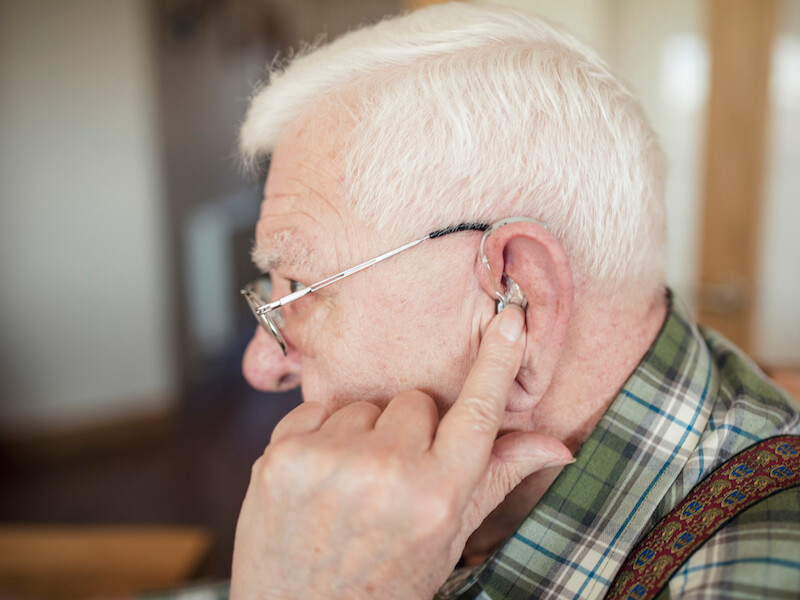
Does it seem as if your hearing aid batteries lose their charge too quickly? Here are a few unexpected reasons that could happen.How long should hearing aid batteries last? Between 3 to 7 days is typical. That range is pretty wide. So wide, actually, that it’s unpredictable and leaves you in a serious predicament. Things could suddenly get quiet when you’re trying to hear the cashier at the supermarket after 4 days of battery power. Or it’s day 5 and you’re having a call with friends when suddenly you find yourself feeling really alone because you can no longer follow the conversation. Now, you’re watching TV. You can no longer hear the news. Hold on, it’s only day 2. Yes, sometimes they even die before that 3-day mark. It’s more than a little inconvenient. You simply can’t tell how much battery power you have left in your hearing aids and it’s causing you to miss out on life. Here are the likely culprits if your hearing aid batteries drain too soon.
A Battery Can be Depleted by Moisture
Did you realize that humans are one of the few species that release moisture through their skin? It’s a cooling mechanism. We do it to clear out excess toxins or sodium in the blood. On top of this, you might live in a humid or rainy climate where things get even wetter. This excess moisture can clog the air vent in your device, making it less effective. It can even drain the battery directly by interacting with the chemicals which produce electricity. Here are some measures you can take to prevent moisture-caused battery drain:
- Don’t leave the batteries in if you’re storing them for a number of days
- Moist conditions, like the kitchen or bathroom aren’t a good place to keep your hearing aids
- When you store your hearing aids, open the battery door
- A dehumidifier for your hearing aid is recommended
Batteries Can be Depleted by Advanced Hearing Aid Features
You get a much better hearing aid nowadays than you did even 10 years ago. But if you’re not keeping your eye on them, these advanced features can cause faster battery drain. Don’t avoid using your favorite features. But be aware that if you stream music all day from your mobile device to your hearing aids, you’ll have to replace the battery sooner. Bluetooth, multichannel, tinnitus relief, noise canceling — all of these added functions can deplete your battery.
Altitude Changes Can Impact Batteries Too
Moving from a low to high altitude can deplete your batteries, particularly if they’re on their last leg. Bring some extra batteries if you are going on a plane or high up into the mountains.
Perhaps The Batteries Aren’t Really Low
Some hearing aids let you know when the battery is running low. These warnings are, under normal circumstances, a “heads up”. They’re not telling you the battery is dead. On top of this, sometimes an environmental change in humidity or altitude briefly causes the charge to drop and the low battery alert gets triggered. In order to end the alarm, take the batteries out, and then put them back in. The battery might last several more hours or even days.
Handling Batteries Improperly
Wait until you’re ready to use your hearing aid to remove the tab from the battery. Make sure you wash your hands before touching your hearing aids or batteries to protect against getting dirt or hand oil on them. Hearing aid batteries should never be frozen. This strategy may increase the life of some types of battery but it doesn’t work with hearing aid batteries. Simple handling mistakes such as these can cause hearing aid batteries to drain faster.
It’s Not a Good Plan to Buy a Year’s Supply of Batteries
Buying in bulk is typically a smart money move when you can afford to do it. But the last few batteries in the pack most likely won’t have full power. Try to stick with a 6-month supply or less unless you’re fine with wasting a few.
Shopping For Hearing Aid Batteries on The Internet
This isn’t an over-all criticism of purchasing things online. There are some pretty good deals out in cyberspace. But some less scrupulous people sell batteries on the internet that are very near to the expiration date. Or even worse, it has already passed. So you need to be careful.
There’s an expiration date on both alkaline and zinc batteries. You wouldn’t buy milk without looking at the expiration date. You should do that with batteries too. If you want to get the most out of your pack, be certain the date is well in the future. It’s probably a smart idea to message the vendor if there isn’t an expiration date or better yet, come see us for your battery needs. Be sure you know and trust the seller.
Now You Can Get Rechargeable Hearing Aids
There are several reasons that hearing batteries might drain rapidly. But by taking some precautions you can get more energy from each battery. You might also consider rechargeable hearing aids if you’re going to buy a new set. If you charge them while you sleep, you get a full day of power the next day. And you only need to replace them every few years.